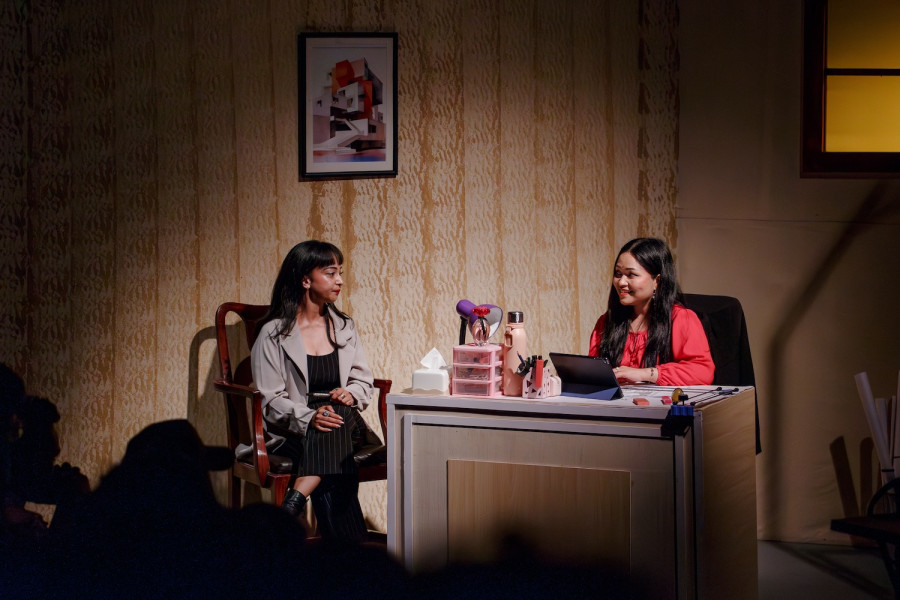Theater
Play the system, or it plays you
Kathaghera’s ‘Play the System’ is a comic exploration of the discrimination and sexism women face in the workplace.
Anusha Dhakal
In the highest room of the office, illuminated by lights ranging from warm yellows to cold blues, two men launch into a vile tirade about their female colleague. Fueled by alcohol, they spew an exorbitant amount of profanity in every sentence. “What a bitch!” they whine repeatedly (among other disgraceful rants.)
As their profanity intensifies and they descend into a frenzy, the story unfolds: their female colleague had merely voiced her frustration about feeling underutilised and underestimated in the office. She communicated, though cunningly, about how she was given fewer projects than her male colleague, who contributed little.
Communicating assertively about discrimination in the workforce? Indeed! What a bitchy thing to do.
Sexist men in the workplace are infuriating beyond belief. This fury and exasperation is amplified in the workforce because sexist men severely underestimate women. They often refuse to collaborate with you due to their long-internalised assumption of female incompetence.
‘Play the System’ is a familiar play because it reflects the common sexism and discrimination women and girls face in the workforce. To sexist ‘corporate bros,’ women are merely decorative, and subservience is a woman’s most remarkable quality.
This theatre production capitalises on stereotypes, increasing its relatability. Kausi Theatre's compactness fully envelops the audience, and the wonderful actors completely captivate from the start.
You are so intensely focused that you find yourself cursing alongside the characters, feeling their frustration boiling within you, and recollecting similar experiences from your own life.
Sailesh (played by Eelum Dixit) is the boss who favours his male colleague over his female counterpart and exhibits severe discrimination against women. Biswas (played by Suraj Malla) is the enabler, a bystander who occasionally voices mild dissonance about women to appease his boss but generally remains silent.
Pankaj (played by Rishikesh Basyal) is a stereotypical slacker, all talk and no action, who uses philosophical jargon to mask his incompetence.
Chahana (played by Roshani Syanbo) is a quintessential “pick me” character. She is eager to please the men in the office, switching her tone to please them and complying without protest.
She is the embodiment of submission, which is why the men in the office tolerate her. Namita (played by Ranjana Bhattarai) is confident, smart, and exceptionally talented, but in this competitive architecture firm, she must navigate the system carefully to be taken seriously.
Namita’s theme song would undoubtedly be Taylor Swift's ‘The Man’: “I'm so sick of running as fast as I can, wondering if I would get there quicker if I was a man.”
In contrast to her colleague Pankaj, who garners praise for minimal effort, Namita struggles to secure meaningful assignments and faces pervasive assumptions of incompetence.
Even when she delivers, her achievements are frequently overlooked and overtly scrutinised. Her story reflects the broader challenges working women endure in male-dominated fields, where despite their undeniable talent, they are often unfairly judged as sub-par or deemed incompetent.
Women often have to go out of their way just to be acknowledged or appreciated. The rat race and corporate grind become even more intense for women due to the additional hurdles they face. Namita has no choice but to become the “bitch” her coworkers think she is, or she won't survive the workplace.
Despite the discrimination and frustrations she faces, Namita persists.

The dynamics between Namita and Chahana are deeply interesting to watch. Both women are victims of rampant sexism in their workplace, but they respond differently: Chahana bends to the discrimination, while Namita protests against it.
From the audience's perspective, neither woman is wrong—they are simply doing what it takes to survive in a male-dominated, toxic environment. They clash over this difference, with Namita judging Chahana for choosing to stay ignorant, while Chahana criticises Namita for being too confrontational and not complying with the 'system' that discriminates against her.
Watching these characters interact with one another is highly amusing. A recurring joke about ‘piping’ threads throughout the production, becoming funnier each time the issue is mentioned. The actors skillfully make the audience love and hate them simultaneously—all characters are grey to varying degrees.
It can be enjoyable to watch a grey female character; the majority of the audience may even think ‘good for her,’ when Namita cunningly plays games to preserve herself within the system.
For women, this play is catharsis. The moment when Namita breaks down, overwhelmed by the realisation that no matter how hard she tries, it is never enough, becomes a pivotal point of emotional release. Watching how Namita is treated by the audience may also help women recognise that, more often than not, they are not the problem; sexism is.
This play would’ve easily been five stars if it didn’t have the ending it does. It felt as if the ending drove the play away from the message it was originally trying to convey.
However, with brilliant writing, wonderful actors, beautiful set design, and an evocative storyline that represents women’s plight, this play is a must-watch. For me, it might even warrant a re-watch because it delivers an important message while being deeply engaging, funny, delightful, and wholesome at times.
It accurately depicts human relationships and is a release for women who have always been suppressed or labelled as ‘bossy’ for simply being competent and confident.
Despite claims that feminism is unnecessary and sexism is non-existent (by the Saileshs and Pankajs themselves), the impact this play has on women proves otherwise.
With sexism, it is important to take the bull by the horns, as there is no progress in the face of denial. By acknowledging the impacts of sexism, we are actively sparing confident little girls who are unfairly labelled as 'bossy' or 'annoying' from the challenges faced by women like Namita.
Play the System
Director: Akanchha Karki
Cast: Eelum Dixit, Ranjana Bhattarai, Suraj Malla, Roshani Syangbo, Rishikesh Basyal
Duration: 1 hour 30 minutes
Venue: Kausi Theatre, Teku
Showtimes: Every day at 5:15 pm and an extra 1:00 pm show on Saturday until July 15




 18.35°C Kathmandu
18.35°C Kathmandu











